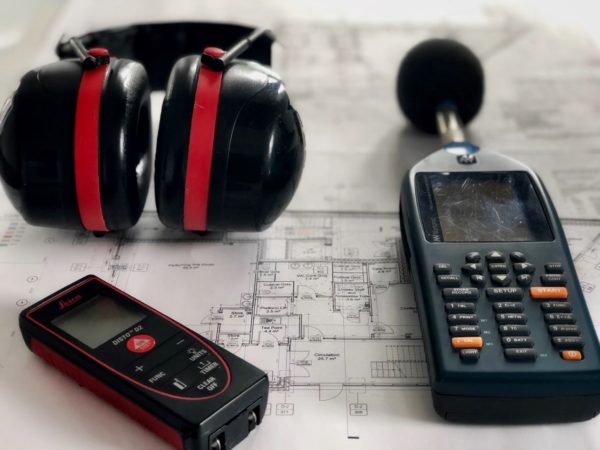The Performance Standards to Pass Part E Sound Testing
Approved Document E stipulates the performance you need to achieve for each type of dwelling when it comes to the precompletion sound testing. The requirements usually depend on whether the dwelling is a new-build or formed by a material change of use e.g., a conversion project. There is also a slight variance if you have a project containing rooms for residential purposes e.g., student accommodation or hotel rooms and HMO. student accommodation etc) rather than dwellings such as houses or flats.
There is a he minimum acoustic retirement for Party walls and Party floors. the airborne sound insulation performance for new-build party walls and floors is 45 dB DnTw + Ctr and for conversions is 43 dB DnTw + Ctr. The requirement for impact sound insulation on new-build floors is a maximum L’nTw of 62 dB; and for conversions the maximum value is 64 dB L’nTw. It’s worth noting that for airborne sound insulation, the performance requirement is a minimum value i.e. your result needs to 45 dB DnTw + Ctr or above and for impact sound insulation the performance requirement is a maximum value i.e. L’nTw of 62 dB or lower to pass.
How many Sound tests are needed on your project?
The number of sound tests you will need for your project, depends on the number of units /adjacent dwellings and the different types of construction used. Approved Document E recommends as a minimum that one set of tests (1 x 6 pack) is undertaken for every ten dwellings of the same type and same construction – this usually allows for 2 airborne wall, 2 airborne floor and 2 impact floor tests. The number of individual tests in a set of tests varies but is usually no more than six sound tests per set in total.
For a block of flats (up to 10 dwellings) you usually require the following tests:
-
-
-
-
-
-
-
- Two airborne sound tests on party walls (one bedroom to bedroom & one lounge to lounge)
- Two airborne sound tests on party floors (one bedroom to bedroom & one lounge to lounge)
- Two impact sound tests on party floors (one bedroom to bedroom & one lounge to lounge)
-
-
-
-
-
-
For a pair of semi-detached houses, you usually require the following tests:
-
-
-
-
-
-
-
- Two airborne sound tests on party walls (one bedroom to bedroom & one lounge to lounge)
-
-
-
-
-
-
At what stage do we carry out the sound insulation testing?
To give your-self the best chance of passing the precompletion sound testing, all the dwellings need to fully complete, in terms of walls, floors, ceilings, windows, doors must be installed. Also, secondary items such as trickle vents, door seals, electrical sockets and switches must also be installed. It is worth noting that tests on floors must be conducted without soft coverings such as carpet and/or foam backed vinyl etc. installed. For more information on correct site conditions needed to complete a sound insulation test, please read our sound test checklist guide for more information.
What happens if the property fail the sound insulation testing?
If a party wall or floor fails the sound testing and does not meet the minimum performance requirements of Approved Document E, Building Control will usually ask for remedial work to upgrade the acoustic construction of the party wall/floor and after the works are completed, another set of sound test/s to facilitate a pass to attain Building Control sign off.
Using our acoustic design experience, we can usually identify the reasons for the acoustic test failure. By analyzing the test results and carefully listening for the noise paths transmitted through the dwellings, we can normally provide basic advice on the day of testing; however, on rare occasions the reasons for acoustic failure can be less obvious, and further investigative work may be required using non-destructive methods such as acoustic cameras that can accurately identify the problem with a high degree of precision.
We can help with your acoustic design and sound testing
If you are unsure about how many sound insulation tests you require, or which walls or floors require acoustic improvements to meet the requirements of Approved Document E, please give us a call and we will be happy to talk you through the process. Contact APT Sound Testing on 01525 303905 or email info@aptsoundtesting.co.uk


